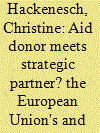| Srl | Item |
| 1 |
ID:
120104


|
|
|
|
|
| Publication |
2013.
|
| Summary/Abstract |
The motives, instruments and effects of China's Africa policy have spurred a lively debate in European development policy circles. This paper assesses the "competitive pressure" that China's growing presence in Africa exerts on the European development policy regime. Drawing on a large number of interviews conducted in China, Ethiopia and Europe between 2008 and 2011, the paper analyses Ethiopia as a case study. Ethiopia has emerged as one of the most important countries in Chinese as well as European cooperation with Africa. Yet, Chinese and European policies toward Ethiopia differ greatly. The EU mainly engages Ethiopia as an aid recipient, whereas China has developed a comprehensive political and economic partnership with the East African state. China has thereby become an alternative partner to the Ethiopian government, a development that both sheds light on the gap between European rhetoric and policy practice and puts pressure on the EU to make more efforts to reform its development policy system.
|
|
|
|
|
|
|
|
|
|
|
|
|
|
|
|
| 2 |
ID:
126628


|
|
|
|
|
| Publication |
2013.
|
| Summary/Abstract |
The European Union has developed a one-size-fits-all approach to promote good governance reforms in African countries, focusing on strengthening the effectiveness of state institutions while increasingly asking for reforms that also target their democratic quality. Assessing the EU's policies in Angola and Ethiopia reveals, however, that the implementation of this approach is more differential. While the EU has a hard time making the two governments address governance issues, it has been more successful in implementing its policy approach in Ethiopia than in Angola. These differences are largely explained by these countries' different degrees of interdependency with the EU rather than differences in stability and democracy. Unlike Angola, Ethiopia heavily relies on EU development aid, giving the EU greater leverage to push for governance reforms. While conditionality is more effective in making African governments address governance issues, it undermines the legitimacy of the EU's development cooperation, which emphasizes partnership and ownership.
|
|
|
|
|
|
|
|
|
|
|
|
|
|
|
|